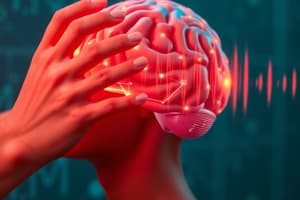Podcast
Questions and Answers
Which type of cognitive intervention primarily aims to improve or maintain abilities in specific cognitive domains?
Which type of cognitive intervention primarily aims to improve or maintain abilities in specific cognitive domains?
- Cognitive training (correct)
- Cognitive stimulation
- Psychoeducation
- Cognitive rehabilitation
What percentage of people with dementia in the UK live in the community?
What percentage of people with dementia in the UK live in the community?
- 33%
- 66% (correct)
- 50%
- 75%
Which type of coping strategies is associated with decreased symptoms of anxiety and depression in dementia carers?
Which type of coping strategies is associated with decreased symptoms of anxiety and depression in dementia carers?
- Emotion-focused and acceptance-based coping (correct)
- Dysfunctional coping
- Avoidance coping
- Problem-focused coping
What is a significant limitation of cognitive rehabilitation as cited in the content?
What is a significant limitation of cognitive rehabilitation as cited in the content?
What role do unpaid carers play in the total costs of caring for people with dementia in the UK?
What role do unpaid carers play in the total costs of caring for people with dementia in the UK?
Cognitive stimulation is primarily characterized by which of the following elements?
Cognitive stimulation is primarily characterized by which of the following elements?
What type of psychological intervention is considered a key component of high-quality dementia care for family carers?
What type of psychological intervention is considered a key component of high-quality dementia care for family carers?
Which strategy has not been found to help with anxiety and depression among dementia carers?
Which strategy has not been found to help with anxiety and depression among dementia carers?
What is a primary goal of cognitive rehabilitation for people with dementia?
What is a primary goal of cognitive rehabilitation for people with dementia?
Which of the following statements about cognitive stimulation is true?
Which of the following statements about cognitive stimulation is true?
Which statement accurately describes the role of unpaid carers for individuals with dementia in the UK?
Which statement accurately describes the role of unpaid carers for individuals with dementia in the UK?
According to NICE guidelines, what is recommended for people with mild or moderate dementia?
According to NICE guidelines, what is recommended for people with mild or moderate dementia?
What does the NICE recommend regarding psychological therapy for dementia carers?
What does the NICE recommend regarding psychological therapy for dementia carers?
Which type of coping strategy is less effective for reducing symptoms of anxiety and depression in dementia carers?
Which type of coping strategy is less effective for reducing symptoms of anxiety and depression in dementia carers?
What is the main distinction between cognitive training and cognitive rehabilitation?
What is the main distinction between cognitive training and cognitive rehabilitation?
Which of the following accurately reflects the demographics of individuals with dementia in the UK?
Which of the following accurately reflects the demographics of individuals with dementia in the UK?
Flashcards
Cognitive Stimulation
Cognitive Stimulation
A non-specific cognitive stimulation program with a social element, often used for people with dementia. It aims to improve cognition and quality of life.
Cognitive Training
Cognitive Training
Guided practice on specific cognitive tasks; usually focuses on improving or maintaining cognitive abilities directly. Can be individual or group.
Cognitive Rehabilitation
Cognitive Rehabilitation
A personalized approach to improving & restoring cognitive abilities in people with dementia using relevant goals. Aims to improve cognitive functioning.
Dementia Carers
Dementia Carers
Signup and view all the flashcards
Emotion-focused coping
Emotion-focused coping
Signup and view all the flashcards
Dysfunctional coping strategies
Dysfunctional coping strategies
Signup and view all the flashcards
Problem-focused coping strategies
Problem-focused coping strategies
Signup and view all the flashcards
Solution-focused coping strategies
Solution-focused coping strategies
Signup and view all the flashcards
Reality Orientation
Reality Orientation
Signup and view all the flashcards
Cognitive Stimulation: Goal?
Cognitive Stimulation: Goal?
Signup and view all the flashcards
Cognitive Training: Focus
Cognitive Training: Focus
Signup and view all the flashcards
Cognitive Rehabilitation: Approach
Cognitive Rehabilitation: Approach
Signup and view all the flashcards
Dementia Caregivers: Role
Dementia Caregivers: Role
Signup and view all the flashcards
Emotion-Focused Coping: Benefits
Emotion-Focused Coping: Benefits
Signup and view all the flashcards
Dysfunctional Coping: Impact
Dysfunctional Coping: Impact
Signup and view all the flashcards
Problem-Focused Coping: Limitations
Problem-Focused Coping: Limitations
Signup and view all the flashcards
Study Notes
Psychosocial Interventions in Dementia
- Cognitive Stimulation: Involves non-specific cognitive stimulation plus social elements, often in group settings. Evidence shows improvements in cognition and quality of life. NICE guidelines recommend structured group programs for mild to moderate dementia.
- Cognitive Training: Guided practice on specific cognitive tasks, targeting cognitive impairment. This may be individual or in groups, focusing on isolated cognitive abilities. Can be restorative or involve psychoeducation and strategy training. The aim is to improve or maintain cognitive abilities in specific domains.
- Cognitive Rehabilitation: Focuses on an individual's needs, setting personally relevant goals for improved cognitive abilities using enhanced environments. This approach aims to improve cognitive abilities by promoting plasticity in the brain. It can combine restorative and compensatory strategies with psychoeducation and training.
People with Dementia and Their Carers
- Prevalence: In the UK, approximately 816,000 people live with dementia, with two-thirds being women. About two-thirds of people live in the community, one-third in care homes.
- Caregivers: 670,000 unpaid carers support people with dementia in the UK, contributing to 44% of total caring costs. A significant portion (70-80%) of people with dementia are cared for at home by family or friends.
- Policy Context: NICE recommends psychological therapy for family dementia carers as a crucial component of high-quality dementia care. The MSNAP also highlights the importance of psychological interventions for family carers.
Psychological Needs of Family and Friend Carers
- Coping Strategies: Emotion-focused and acceptance-based coping strategies are associated with reduced anxiety and depression symptoms in carers compared to dysfunctional coping styles. Problem-solving strategies aren't as effective in reducing caregiver distress.
- Caregiver Psychosocial Factors: Caregiver psychosocial factors contribute significantly (56%) to distress associated with behavioral and psychological symptoms of dementia (BPSD).
- CBT Interventions: Individual Cognitive Behavioral Therapy (CBT) appears more effective for carers experiencing depression. More structured longer-term interventions and active therapy components are more beneficial, as well as educational and therapeutic aspects.
Interventions for Carers
- iSupport (WHO): A WHO-developed online training program for dementia caregivers. However, evidence of its effectiveness has been limited in some countries but remains a subject of continuing evaluation.
- START Project: A pioneering UK trial testing manual-based therapy for dementia carers, led by graduates. This involves managing support, team skills, and individual suitability to deliver the intervention.
Studying That Suits You
Use AI to generate personalized quizzes and flashcards to suit your learning preferences.




